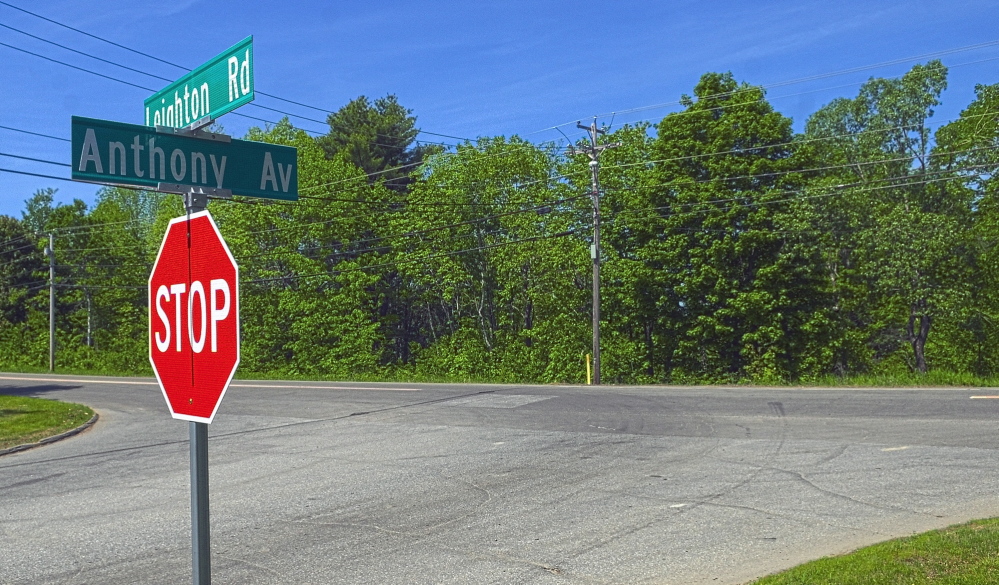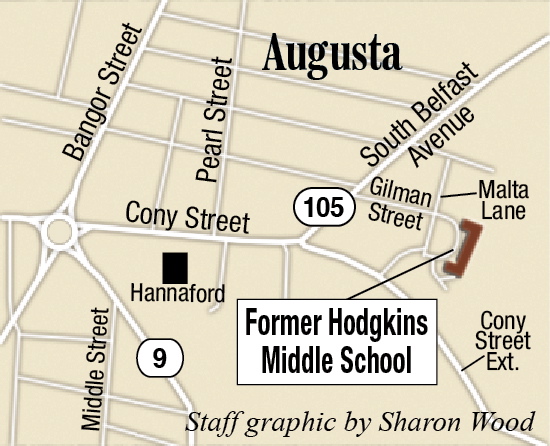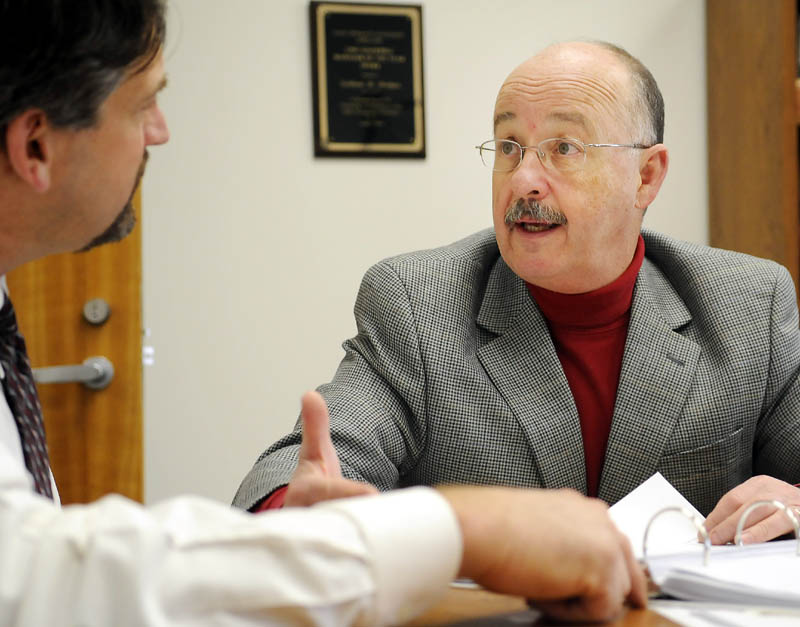AUGUSTA — City officials say Augusta reached, or at least made progress on, most of the City Council’s goals for 2014.
From getting voter approval to expand and renovate Lithgow Public Library and build a new fire station in north Augusta to receiving a clean audit of city finances, City Manager William Bridgeo and Mayor David Rollins said the city did what it set out to do.
“I think we’ve done a spectacular job” making progress on goals for the year, Rollins said Tuesday.
He said there has been an increase in business development, which is an ongoing goal, and the city has also worked to make neighborhoods more welcoming and attractive and budgeted responsibly despite cuts in state funding.
Other goals for the city set by councilors, however, were left unaccomplished. They include rezoning some of the area around the new MaineGeneral Medical Center hospital in north Augusta, studying crime trends, drawing in a private developer to redevelop the city-owned former Statler mill site and bringing development to the Riggs Brook Village District on the city’s east side off Route 3.
Bridgeo, in his annual year-end memo reviewing the city’s year and progress toward meeting the council’s goals, said while the city has not yet attracted a developer to the former Statler site, which the city now calls Kennebec Lockes, it has concluded the environmental cleanup of the site and expects to receive a state certification of the cleanup soon.
Veteran At-Large City Councilor Cecil Munson hopes a proposal to return passenger rail service to the city, with a station located on the Kennebec Lockes property, could move forward and bring development to the city’s east side, but acknowledged such a proposal is not likely to happen soon.
He said zoning changes meant to eliminate confusing building rules in the Riggs Brook Village District, which is near the intersection of Route 3 and Church Hill Road, should help existing businesses there expand, but significant commercial development in that area won’t really occur until sewer and water lines are brought to that part of the city.
“We did rezone that a bit to help existing businesses fit in, but the bottom line on (the Riggs Brook Village District) is water and sewer,” Munson said. “If you don’t have that, you can’t move forward. I think that’s something the council, the Greater Augusta Utility District, and the business community might want to focus on a little more.”
A planned study and report on the changing nature of crime in Augusta was deferred this year in part because Police Chief Robert Gregoire was out of work because of serious injuries he suffered in a motorcycle accident, Bridgeo said.
Bridgeo noted there haven’t been any concrete proposals to bring new businesses or uses to the area surrounding the new hospital, so rezoning there “has not been a front-burner item to date.”
Other council goals relating to infrastructure appear to have largely been accomplished.
In June, Augusta voters overwhelmingly approved borrowing $8 million to be combined with about $2 million raised privately by Friends of Lithgow Library to nearly triple the size of and expand the city’s historic public library.
That would appear to accomplish one of the council’s six goals for the year, which was to secure financing for the Lithgow project.
In November, voters approved borrowing $3.6 million to build a new fire station to serve the growing north Augusta area and $1 million for a new multi-purpose firetruck to replace the city’s aging ladder truck as parts of an $8.1 million bond package. Bridgeo said paying back those bonds isn’t expected to increase property taxes, because officials plan to pay them back using proceeds from tax increment financing funds collected from development in designated TIF districts in the city.
“That was creative use of TIF funds to get the fire station and fire engine. It’s a credit to voters they recognized that was a good thing to do,” Munson said. “Ralph St. Pierre (finance director and assistant city manager) and our great city manager and the council have been very careful in terms of making sure taxpayer money is used as wisely as we can, in spite of cuts we’ve received from the state.”
Ongoing work at the former Hodgkins Middle School building, Bridgeo said, converting it into housing for low-income senior citizens, helps address two different council goals: addressing infrastructure by exploring what to do with the city-owned vacant building and making neighborhoods attractive and welcoming.
Hodgkins is not being redeveloped directly by the city, as that project is overseen by the quasi-municipal Augusta Housing Authority, which recently secured approval for federal low-income housing tax credits to help finance the estimated $8.7 million project. However, the city has assisted Amanda Bartlett, director of the housing authority, on the project and in May approved a 90-year-lease of the building to the housing authority for $1 a year.
Communicating better with partners, another council goal for the year, was accomplished in large part by city officials working with numerous local and state groups, including the housing authority, Augusta Downtown Alliance, University of Maine at Augusta, Kennebec County and others, Bridgeo said.
Whether the council reached its final goal, to “budget responsibly,” is likely up to the eye of the beholder.
The city did increase property taxes by about 3 percent, which was down about 3 percent from Bridgeo’s original budget proposal.
Bridgeo, Rollins and Munson noted the city maintained its current services to residents and businesses despite taking a $620,000 cut in state revenue sharing, funding the city relies on to help limit the reliance on property taxpayers for revenue.
“I think we were very, very responsible budgeting and the discussion was very public and very open, and we were successful in maintaining the necessary services,” Rollins said. “We’ve done extensive cutting over the last eight years.”
In a recent report from an independent auditor with Runyon Kersteen Ouellette who reviewed the city’s financial books for the past year, the city received what Bridgeo said was an “unqualified clean audit” with no recommendations for changes to city financial records. Bridgeo, a city manager in Augusta for 16 years with prior years as a manager before coming to Augusta, said it is the first time a municipality where he has worked received such a clean audit report.
Councilors and city administrators plan to meet Jan. 24 to plan and discuss goals for the coming year.
Rollins said it is likely to be a challenging year ahead, with talk already prevalent that the state may further cut revenue sharing to municipalities, which, in turn, would make balancing the city budget more of a challenge.
“We’re all waiting to see what’s coming down from the state, because there is probably going to be more of a tax shift coming from state government,” Rollins said. “So it’s going to be more important than ever to budget responsibly. Though I’m not sure what that’s going to mean this year. The more input we get from taxpayers, the less guessing we have to do, so I’d encourage everybody to talk to councilors, come to city hall and participate. I think we’re heading for a very challenging time.”
Keith Edwards — 621-5647
kedwards@centralmaine.com
Twitter: @kedwardskj
Copy the Story LinkSend questions/comments to the editors.








Success. Please wait for the page to reload. If the page does not reload within 5 seconds, please refresh the page.
Enter your email and password to access comments.
Hi, to comment on stories you must . This profile is in addition to your subscription and website login.
Already have a commenting profile? .
Invalid username/password.
Please check your email to confirm and complete your registration.
Only subscribers are eligible to post comments. Please subscribe or login first for digital access. Here’s why.
Use the form below to reset your password. When you've submitted your account email, we will send an email with a reset code.